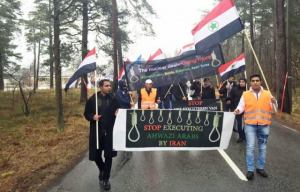Iranian regime introduces new European languages school syllabus – while denying Iran’s ethnic minorities the right to education in their own languages
Posted: 05/09/2016 by editormary in Ahwaz, Children\'s Corner, Culture and Heritage, Education,Grassroots Activism, Human Rights, Iran, People's Movements / Struggles, Resistance, Somoud: Arab Voices of Resistance
These are the ‘school’ conditions for many Ahwazi Arab children in rural areas, who are denied the most basic education facilities unlike Persian children
Written by Rahim Hamid
While tens of millions of Iranian citizens from various ethnic minorities are denied the right to education in their mother language, the regime has now announced the introduction of a new compulsory language syllabus in five European languages.
A few days after President Hassan Rouhani emphasized the need for education in foreign languages, Ahmad Abedini, the deputy of the regime’s Supreme Council of Education and Training announced that education in five languages – German, French, Italian, Spanish and Russian – will now be mandatory in Iran’s schools.
The regime’s newfound enthusiasm for education in languages other than Farsi doesn’t extend, however, to the native languages of many of its citizens, with Arabs in Ahwaz, Kurds in East Kurdistan, and Turks in South Azerbaijan denied the right to education in their mother tongues and brutally persecuted for using their own languages. This policy is strictly maintained despite the fact that Articles 15 and 19 of the Iranian constitution specifically state respectively that “ethnic literature” should be available to pupils in all schools and that all of Iran’s non-Persian ethnic minorities have the right to education in their native languages. Farsi remains the official state language and the only one used throughout the education system despite the fact that it is the native tongue of less than half of Iran’s population.
The theocratic regime’s discriminatory and supremacist policies towards the country’s ethnic minorities are a continuation of those practiced by the secular monarchy, overthrown in the 1979 revolution.
Although the publication of material in other languages is tolerated (barely) by the Iranian leadership, the regime’s vilification of those ethnic groups using non-Farsi languages is systemic and relentless. A recent and typical example of this was the Persian-Iranian primary school teacher in Ahwaz who forced two Ahwazi Arab pupils to wash out their mouths with soap and water for speaking in their Arabic mother tongue. The teacher at a school in the Amaniyeh neighbourhood of the Arab region’s capital also warned other pupils that they would face the same punishment if he heard them speaking Arabic or if they were reported to have done so in his absence.
This incident sparked further outrage and resentment amongst Ahwazi people who already face extensive apartheid-style discrimination and legislation outlawing their Arab language, dress and culture.
The regime has acknowledged none of its blatant discrimination towards Iran’s ethnic minorities in its new language education program. Indeed, Rouhani has called on other cultural institutions to allocate funds for language education and training – for English and the other aforementioned European languages – adding that a proposal to prioritise the teaching of these languages has been put forward to the Supreme Revolutionary Cultural Council.
While the regime president has argued that the teaching of English should be prioritised since it’s the principal language of science and technology internationally, the Supreme Leader Ayatollah Khamenei is less convinced, criticising any “insistence on the promotion exclusively of English”, adding “The language of science is not just English… I don’t mean to shut down the teaching of English from tomorrow, but we ought to know what we are doing.”
Rouhani, who believes that the teaching of English should be the first priority for Iran’s advancement, had said, “You see the Indian subcontinent; because of the huge population most are almost fluent in English. Look at what they have done in information technology and how greatly the subcontinent has gained. We must teach the language that would be best for scientific progress, creating more jobs for the younger generation and facilitating the future of our communication economy with the world. ”
The president’s praise for India’s adoption of English as an example was quickly criticised, with state media organ Tasnim quoting Sepehr Khalaji, the director of the Ayatollah’s Public Relations office, as writing in a statement published on Instagram, “Due to British colonial domination of India and a planned erasure of its people’s cultural identity to force them into compliance, India was forced into learning English. This is precisely the effects of colonialism that, as a first step, removes the signs of cultural and national identity in an effort to destroy the spirit of independent-mindedness among the populace. So this colonialist method of learning a language is not an honourable one to cite as an example.”
The official did not seem to recognise the irony of such criticism coming from a representative of a regime which pursues the colonialist policies of its predecessors who forcibly annexed and colonised Ahwazi Arabs’ lands with British support in 1925 and have ever since enforced Farsi as the dominant language, refusing the people their right to education in their own language in an effort to crush the spirit of independent-mindedness among its populace.
It should also be mentioned that “linguistic justice” is a principle enshrined in international law, including the United Nations’ Universal Declaration of Human Rights, which criminalises discrimination in the areas of language, ethnicity or religion, three of the areas in which the Islamic Republic’s regime discriminates openly and brutally against millions of its own citizens.


No comments:
Post a Comment